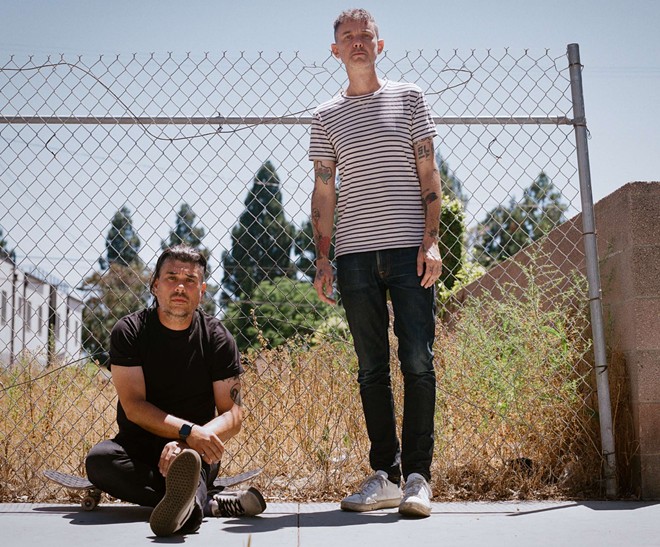There's something about the 20-year mark when it comes to bands touring on album anniversaries. Ten years? Too soon for much to have changed. 30 years? The members — and the audience — have gotten old.
Sparta guitarist-vocalist Jim Ward seems to have an inherent sense of this and is using the 20th anniversary of the post-hardcore band's debut album, Wiretap Scars, to revisit the material and ask himself what it means to him now.
A tour to mark the anniversary stops at San Antonio's Rock Box on Friday, June 16. We caught up with Ward on Zoom in April as he readied to launch the tour.
Ward was friendly, polite and engaged, even when answering questions he's surely answered a million times before. A neatly arranged room was visible behind him, including a shelf with horizontal stacks of books. Not great for Room Rater maybe, but a metaphor for Ward himself: what you see is what you get. No excess clutter.
This year actually marks 21 years since Wiretap Scars' initial release. However, the original tour promoting the release went on for 18 months, Ward explains with a laugh, "so I'm counting that."
While there's always a sense of nostalgia in such tours, Ward said he's not stepping into a time machine.
"This tour is me playing this record at 46. It was a huge part of my life but a complicated part of my life," Ward said. "I'm a better guitar player now. I'm a better singer now."
'Un-famous guys'
Ward emerged on the national radar 30 years ago as a founding member of El Paso art punks At the Drive-In. He filled the Little Steven Van Zandt spot in the band, belting out the accessible, sing-along portions of the songs. He was something of a foil.
In contrast was Cedric Bixler-Zavala, whom Ward calls a "born frontman." Bixler-Zavala's high-end vocals, nearly indecipherable lyrics and cryptic-but-in-your-face performing style forged the persona of ATDI, despite Ward delivering those memorable scream-alongs.
ATDI hit it big when Relationship of Command, its breakthrough album, dropped in 2000, but by the next year, the jump to larger stages combined with long-simmering internal tensions ripped the band in two. That moment birthed both Sparta and The Mars Volta.
Ward formed Sparta with who he called "the un-famous guys from ATDI."
The "famous guys" from ATDI that Ward is referring to are, of course, Bixler-Zavala and prolific guitarist Omar Rodriguez-Lopez, a prolific, tortured genius type. Both helm The Mars Volta, which has gone on to tour larger venues and land top spots at summer fests.
For context, The Mars Volta packed San Antonio's Boeing Center at Tech Port in May, while Sparta will be at the considerably smaller Rock Box.
Ward showed no ill will or animosity towards his former bandmates during the interview, noting that the passion that fuels the music can be combustible to offstage relationships.
He's not the kind of guy to rely on nostalgia. He still puts out new music despite acknowledging that Relationship and Wiretap are the LPs for which he will be remembered.
No direct recreation
What happened to change Ward's mind? The short and easy answer: the pandemic shifted his perspective.
A 2022 tour with fellow scene stalwarts Get Up Kids — and talking to fans on that tour — led him to realize how much Wiretap meant to people and the value of that connection, he explained.
Sparta is touring as a three-piece with bassist Matt Miller and drummer Neil Hennessy, neither of whom appeared on the original LP. Miller has been Ward's frequent collaborator and is the only other permanent member of Sparta.
The trio won't try to recreate every part from the record, according to Ward. Instead, they'll be playing the record as middle-aged men engaging with the material in the present.
The original Wiretap tour used an auxiliary player as well as drum machines. Ward said the lack of these bells and whistles won't damp the songs' impact.
"The sing-alongs will be sung along," he said.
Ward ended the original Sparta around 2008 or 2009 because of the typical personal differences when a band hits a certain point, explaining his decision to revive Sparta with Miller as sole collaborator.
"I lost every vote," he said.
Exercising demons
Ward also owned a bar for a while, and now owns vegan restaurant Eloise in his hometown of El Paso, where he's lived for years.
Speaking of the time of his life that Wiretap came into being, Ward admitted he has a lot of demons he doesn't like to think about, things it took him years to face—particularly his drinking.
Since then, he's done a lot of work on mental health and trying to empathize with fans, trying to understand the things they went through while listening to Wiretap Scars. Some may have fallen in love with their life partners while listening to the record, he noted.
"I don't internalize things," he said of himself now.
Ward said he is now at his healthiest, both physically and emotionally, and he's ready to collaborate and connect. He's also been with his wife for 20 years and appreciates her continued support despite putting her through hard times.
"You don't want to destroy your family for no reason," he said.
His new perspective has also given Ward the confidence to see a musical life that involves something other than Sparta.
"I will be in a band where I'm not the singer," he said, looking down the road. "I have a network of people to collaborate with. I'm excited about that rather than having to be on tour."
$26-$30, 7:30 p.m. Friday, June 16, The Rock Box, 1223 E. Houston St., (210) 772-
Subscribe to SA Current newsletters.
Follow us: Apple News | Google News | NewsBreak | Reddit | Instagram | Facebook | Twitter| Or sign up for our RSS Feed


